Utility header file. More...
#include <stdio.h>#include <stdlib.h>#include <string.h>#include <assert.h>#include "superlu_enum_consts.h"

Go to the source code of this file.
Data Structures | |
| struct | superlu_options_t |
| struct | e_node |
| Headers for 4 types of dynamatically managed memory. More... | |
| struct | LU_stack_t |
| struct | SuperLUStat_t |
| struct | mem_usage_t |
| struct | GlobalLU_t |
Macros | |
| #define | SUPERLU_MAJOR_VERSION 6 |
| #define | SUPERLU_MINOR_VERSION 0 |
| #define | SUPERLU_PATCH_VERSION 1 |
| #define | FIRSTCOL_OF_SNODE(i) (xsup[i]) |
| #define | NO_MARKER 3 |
| #define | NUM_TEMPV(m, w, t, b) ( SUPERLU_MAX(m, (t + b)*w) ) |
| #define | USER_ABORT(msg) superlu_abort_and_exit(msg) |
| #define | ABORT(err_msg) |
| #define | USER_MALLOC(size) superlu_malloc(size) |
| #define | SUPERLU_MALLOC(size) USER_MALLOC(size) |
| #define | USER_FREE(addr) superlu_free(addr) |
| #define | SUPERLU_FREE(addr) USER_FREE(addr) |
| #define | CHECK_MALLOC(where) |
| #define | SUPERLU_MAX(x, y) ( (x) > (y) ? (x) : (y) ) |
| #define | SUPERLU_MIN(x, y) ( (x) < (y) ? (x) : (y) ) |
| #define | L_SUB_START(col) ( Lstore->rowind_colptr[col] ) |
| #define | L_SUB(ptr) ( Lstore->rowind[ptr] ) |
| #define | L_NZ_START(col) ( Lstore->nzval_colptr[col] ) |
| #define | L_FST_SUPC(superno) ( Lstore->sup_to_col[superno] ) |
| #define | U_NZ_START(col) ( Ustore->colptr[col] ) |
| #define | U_SUB(ptr) ( Ustore->rowind[ptr] ) |
| #define | EMPTY (-1) |
| #define | FALSE 0 |
| #define | TRUE 1 |
| #define | GluIntArray(n) (5 * (n) + 5) |
| #define | NODROP ( 0x0000 ) |
| #define | DROP_BASIC ( 0x0001 ) /* ILU(tau) */ |
| #define | DROP_PROWS ( 0x0002 ) /* ILUTP: keep p maximum rows */ |
| #define | DROP_COLUMN |
| #define | DROP_AREA |
| #define | DROP_SECONDARY ( 0x000E ) /* PROWS | COLUMN | AREA */ |
| #define | DROP_DYNAMIC ( 0x0010 ) /* adaptive tau */ |
| #define | DROP_INTERP ( 0x0100 ) /* use interpolation */ |
| #define | MILU_ALPHA (1.0e-2) /* multiple of drop_sum to be added to diagonal */ |
Typedefs | |
| typedef float | flops_t |
| typedef unsigned char | Logical |
| typedef struct e_node | ExpHeader |
| Headers for 4 types of dynamatically managed memory. More... | |
Functions | |
| int | input_error (char *, int *) |
| void | Destroy_SuperMatrix_Store (SuperMatrix *) |
| Deallocate the structure pointing to the actual storage of the matrix. More... | |
| void | Destroy_CompCol_Matrix (SuperMatrix *) |
| void | Destroy_CompRow_Matrix (SuperMatrix *) |
| void | Destroy_SuperNode_Matrix (SuperMatrix *) |
| void | Destroy_CompCol_Permuted (SuperMatrix *) |
| A is of type Stype==NCP. More... | |
| void | Destroy_Dense_Matrix (SuperMatrix *) |
| A is of type Stype==DN. More... | |
| void | get_perm_c (int, SuperMatrix *, int *) |
| void | set_default_options (superlu_options_t *options) |
| Set the default values for the options argument. More... | |
| void | ilu_set_default_options (superlu_options_t *options) |
| Set the default values for the options argument for ILU. More... | |
| void | sp_preorder (superlu_options_t *, SuperMatrix *, int *, int *, SuperMatrix *) |
| void | superlu_abort_and_exit (char *) |
| Global statistics variale. More... | |
| void * | superlu_malloc (size_t) |
| int * | int32Malloc (int) |
| int * | int32Calloc (int) |
| int_t * | intMalloc (int_t) |
| int_t * | intCalloc (int_t) |
| void | superlu_free (void *) |
| void | SetIWork (int, int, int, int *, int **, int **, int_t **xplore, int **, int **, int_t **xprune, int **) |
| Set up pointers for integer working arrays. More... | |
| int | sp_coletree (int_t *, int_t *, int_t *, int, int, int *) |
| void | relax_snode (const int, int *, const int, int *, int *) |
| void | heap_relax_snode (const int, int *, const int, int *, int *) |
| int | mark_relax (int, int *, int *, int_t *, int_t *, int_t *, int *) |
| void | countnz (const int n, int_t *xprune, int_t *nnzL, int_t *nnzU, GlobalLU_t *) |
| Count the total number of nonzeros in factors L and U, and in the symmetrically reduced L. More... | |
| void | ilu_countnz (const int, int_t *, int_t *, GlobalLU_t *) |
| Count the total number of nonzeros in factors L and U. More... | |
| void | fixupL (const int, const int *, GlobalLU_t *) |
| Fix up the data storage lsub for L-subscripts. It removes the subscript sets for structural pruning, and applies permuation to the remaining subscripts. More... | |
| void | ilu_relax_snode (const int, int *, const int, int *, int *, int *) |
| void | ilu_heap_relax_snode (const int, int *, const int, int *, int *, int *) |
| void | resetrep_col (const int, const int *, int *) |
| Reset repfnz[] for the current column. More... | |
| int | spcoletree (int *, int *, int *, int, int, int *) |
| int * | TreePostorder (int, int *) |
| double | SuperLU_timer_ (void) |
| Timer function. More... | |
| int | sp_ienv (int) |
| sp_ienv() is inquired to choose machine-dependent parameters for the local environment. More... | |
| int | xerbla_ (char *, int *) |
| void | ifill (int *, int, int) |
| Fills an integer array with a given value. More... | |
| void | snode_profile (int, int *) |
| void | super_stats (int, int *) |
| void | check_repfnz (int, int, int, int *) |
| Check whether repfnz[] == EMPTY after reset. More... | |
| void | PrintSumm (char *, int, int, int) |
| Print a summary of the testing results. More... | |
| void | StatInit (SuperLUStat_t *) |
| void | StatPrint (SuperLUStat_t *) |
| void | StatFree (SuperLUStat_t *) |
| void | print_panel_seg (int, int, int, int, int *, int *) |
| Diagnostic print of segment info after panel_dfs(). More... | |
| int | print_int_vec (char *, int, int *) |
| int | slu_PrintInt10 (char *, int, int *) |
| int | check_perm (char *what, int n, int *perm) |
Detailed Description
Copyright (c) 2003, The Regents of the University of California, through Lawrence Berkeley National Laboratory (subject to receipt of any required approvals from U.S. Dept. of Energy)
All rights reserved.
The source code is distributed under BSD license, see the file License.txt at the top-level directory.
– SuperLU routine (version 4.1) – Univ. of California Berkeley, Xerox Palo Alto Research Center, and Lawrence Berkeley National Lab. November, 2010
Macro Definition Documentation
◆ ABORT
| #define ABORT | ( | err_msg | ) |
◆ CHECK_MALLOC
| #define CHECK_MALLOC | ( | where | ) |
◆ DROP_AREA
| #define DROP_AREA |
◆ DROP_BASIC
| #define DROP_BASIC ( 0x0001 ) /* ILU(tau) */ |
◆ DROP_COLUMN
| #define DROP_COLUMN |
◆ DROP_DYNAMIC
| #define DROP_DYNAMIC ( 0x0010 ) /* adaptive tau */ |
◆ DROP_INTERP
| #define DROP_INTERP ( 0x0100 ) /* use interpolation */ |
◆ DROP_PROWS
| #define DROP_PROWS ( 0x0002 ) /* ILUTP: keep p maximum rows */ |
◆ DROP_SECONDARY
| #define DROP_SECONDARY ( 0x000E ) /* PROWS | COLUMN | AREA */ |
◆ EMPTY
| #define EMPTY (-1) |
◆ FALSE
| #define FALSE 0 |
◆ FIRSTCOL_OF_SNODE
| #define FIRSTCOL_OF_SNODE | ( | i | ) | (xsup[i]) |
◆ GluIntArray
| #define GluIntArray | ( | n | ) | (5 * (n) + 5) |
◆ L_FST_SUPC
| #define L_FST_SUPC | ( | superno | ) | ( Lstore->sup_to_col[superno] ) |
◆ L_NZ_START
| #define L_NZ_START | ( | col | ) | ( Lstore->nzval_colptr[col] ) |
◆ L_SUB
| #define L_SUB | ( | ptr | ) | ( Lstore->rowind[ptr] ) |
◆ L_SUB_START
| #define L_SUB_START | ( | col | ) | ( Lstore->rowind_colptr[col] ) |
◆ MILU_ALPHA
| #define MILU_ALPHA (1.0e-2) /* multiple of drop_sum to be added to diagonal */ |
◆ NO_MARKER
| #define NO_MARKER 3 |
◆ NODROP
| #define NODROP ( 0x0000 ) |
◆ NUM_TEMPV
| #define NUM_TEMPV | ( | m, | |
| w, | |||
| t, | |||
| b | |||
| ) | ( SUPERLU_MAX(m, (t + b)*w) ) |
◆ SUPERLU_FREE
| #define SUPERLU_FREE | ( | addr | ) | USER_FREE(addr) |
◆ SUPERLU_MAJOR_VERSION
| #define SUPERLU_MAJOR_VERSION 6 |
◆ SUPERLU_MALLOC
| #define SUPERLU_MALLOC | ( | size | ) | USER_MALLOC(size) |
◆ SUPERLU_MAX
| #define SUPERLU_MAX | ( | x, | |
| y | |||
| ) | ( (x) > (y) ? (x) : (y) ) |
◆ SUPERLU_MIN
| #define SUPERLU_MIN | ( | x, | |
| y | |||
| ) | ( (x) < (y) ? (x) : (y) ) |
◆ SUPERLU_MINOR_VERSION
| #define SUPERLU_MINOR_VERSION 0 |
◆ SUPERLU_PATCH_VERSION
| #define SUPERLU_PATCH_VERSION 1 |
◆ TRUE
| #define TRUE 1 |
◆ U_NZ_START
| #define U_NZ_START | ( | col | ) | ( Ustore->colptr[col] ) |
◆ U_SUB
| #define U_SUB | ( | ptr | ) | ( Ustore->rowind[ptr] ) |
◆ USER_ABORT
| #define USER_ABORT | ( | msg | ) | superlu_abort_and_exit(msg) |
◆ USER_FREE
| #define USER_FREE | ( | addr | ) | superlu_free(addr) |
◆ USER_MALLOC
| #define USER_MALLOC | ( | size | ) | superlu_malloc(size) |
Typedef Documentation
◆ ExpHeader
◆ flops_t
| typedef float flops_t |
◆ Logical
| typedef unsigned char Logical |
Function Documentation
◆ check_perm()
| int check_perm | ( | char * | what, |
| int | n, | ||
| int * | perm | ||
| ) |

◆ check_repfnz()
| void check_repfnz | ( | int | n, |
| int | w, | ||
| int | jcol, | ||
| int * | repfnz | ||
| ) |
◆ countnz()
| void countnz | ( | const int | n, |
| int_t * | xprune, | ||
| int_t * | nnzL, | ||
| int_t * | nnzU, | ||
| GlobalLU_t * | Glu | ||
| ) |
◆ Destroy_CompCol_Matrix()
| void Destroy_CompCol_Matrix | ( | SuperMatrix * | A | ) |
◆ Destroy_CompCol_Permuted()
| void Destroy_CompCol_Permuted | ( | SuperMatrix * | A | ) |
◆ Destroy_CompRow_Matrix()
| void Destroy_CompRow_Matrix | ( | SuperMatrix * | A | ) |
◆ Destroy_Dense_Matrix()
| void Destroy_Dense_Matrix | ( | SuperMatrix * | A | ) |
◆ Destroy_SuperMatrix_Store()
| void Destroy_SuperMatrix_Store | ( | SuperMatrix * | A | ) |
◆ Destroy_SuperNode_Matrix()
| void Destroy_SuperNode_Matrix | ( | SuperMatrix * | A | ) |
◆ fixupL()
| void fixupL | ( | const int | n, |
| const int * | perm_r, | ||
| GlobalLU_t * | Glu | ||
| ) |
◆ get_perm_c()
| void get_perm_c | ( | int | ispec, |
| SuperMatrix * | A, | ||
| int * | perm_c | ||
| ) |
Purpose
=======
GET_PERM_C obtains a permutation matrix Pc, by applying the multiple
minimum degree ordering code by Joseph Liu to matrix A'*A or A+A'.
or using approximate minimum degree column ordering by Davis et. al.
The LU factorization of A*Pc tends to have less fill than the LU
factorization of A.
Arguments
=========
ispec (input) int
Specifies the type of column ordering to reduce fill:
= 1: minimum degree on the structure of A^T * A
= 2: minimum degree on the structure of A^T + A
= 3: approximate minimum degree for unsymmetric matrices
If ispec == 0, the natural ordering (i.e., Pc = I) is returned.
A (input) SuperMatrix*
Matrix A in A*X=B, of dimension (A->nrow, A->ncol). The number
of the linear equations is A->nrow. Currently, the type of A
can be: Stype = NC; Dtype = _D; Mtype = GE. In the future,
more general A can be handled.
perm_c (output) int*
Column permutation vector of size A->ncol, which defines the
permutation matrix Pc; perm_c[i] = j means column i of A is
in position j in A*Pc.
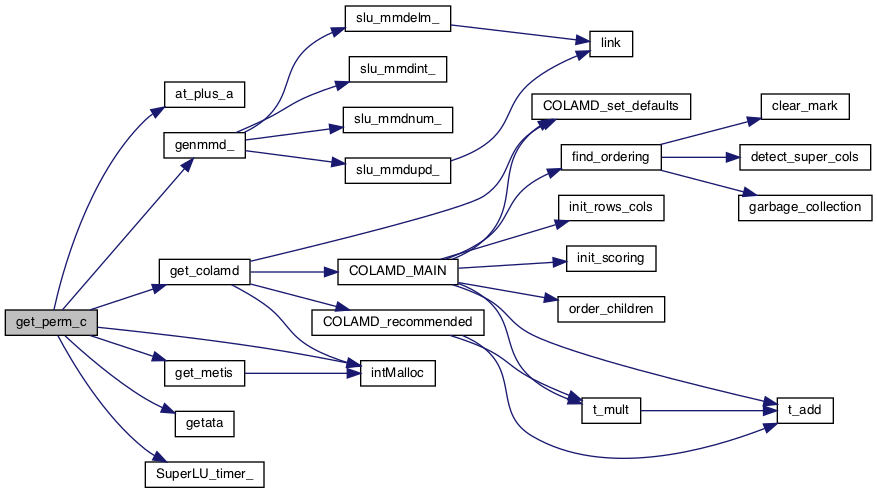
◆ heap_relax_snode()
| void heap_relax_snode | ( | const int | n, |
| int * | et, | ||
| const int | relax_columns, | ||
| int * | descendants, | ||
| int * | relax_end | ||
| ) |
Purpose ======= relax_snode() - Identify the initial relaxed supernodes, assuming that the matrix has been reordered according to the postorder of the etree.
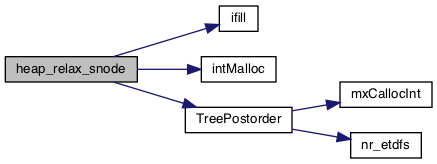
◆ ifill()
| void ifill | ( | int * | a, |
| int | alen, | ||
| int | ival | ||
| ) |
◆ ilu_countnz()
| void ilu_countnz | ( | const int | n, |
| int_t * | nnzL, | ||
| int_t * | nnzU, | ||
| GlobalLU_t * | Glu | ||
| ) |
◆ ilu_heap_relax_snode()
| void ilu_heap_relax_snode | ( | const int | n, |
| int * | et, | ||
| const int | relax_columns, | ||
| int * | descendants, | ||
| int * | relax_end, | ||
| int * | relax_fsupc | ||
| ) |
Purpose ======= ilu_heap_relax_snode() - Identify the initial relaxed supernodes, assuming that the matrix has been reordered according to the postorder of the etree.
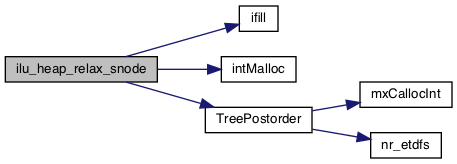
◆ ilu_relax_snode()
| void ilu_relax_snode | ( | const int | n, |
| int * | et, | ||
| const int | relax_columns, | ||
| int * | descendants, | ||
| int * | relax_end, | ||
| int * | relax_fsupc | ||
| ) |
Purpose ======= ilu_relax_snode() - Identify the initial relaxed supernodes, assuming that the matrix has been reordered according to the postorder of the etree.

◆ ilu_set_default_options()
| void ilu_set_default_options | ( | superlu_options_t * | options | ) |

◆ input_error()
| int input_error | ( | char * | srname, |
| int * | info | ||
| ) |
Purpose
=======
INPUT_ERROR is called if an input parameter has an
invalid value. A message is printed and execution stops.
Arguments
=========
srname (input) character*6
The name of the routine which called INPUT_ERROR.
info (input) int
The position of the invalid parameter in the parameter list
of the calling routine.
◆ int32Calloc()
| int * int32Calloc | ( | int | n | ) |
◆ int32Malloc()
| int * int32Malloc | ( | int | n | ) |
◆ intCalloc()
◆ intMalloc()
◆ mark_relax()
| int mark_relax | ( | int | n, |
| int * | relax_end, | ||
| int * | relax_fsupc, | ||
| int_t * | xa_begin, | ||
| int_t * | xa_end, | ||
| int_t * | asub, | ||
| int * | marker | ||
| ) |
Purpose ======= mark_relax() - record the rows used by the relaxed supernodes.
◆ print_int_vec()
| int print_int_vec | ( | char * | what, |
| int | n, | ||
| int * | vec | ||
| ) |
◆ print_panel_seg()
| void print_panel_seg | ( | int | n, |
| int | w, | ||
| int | jcol, | ||
| int | nseg, | ||
| int * | segrep, | ||
| int * | repfnz | ||
| ) |
◆ PrintSumm()
| void PrintSumm | ( | char * | type, |
| int | nfail, | ||
| int | nrun, | ||
| int | nerrs | ||
| ) |
◆ relax_snode()
| void relax_snode | ( | const int | n, |
| int * | et, | ||
| const int | relax_columns, | ||
| int * | descendants, | ||
| int * | relax_end | ||
| ) |
Purpose ======= relax_snode() - Identify the initial relaxed supernodes, assuming that the matrix has been reordered according to the postorder of the etree.

◆ resetrep_col()
| void resetrep_col | ( | const int | nseg, |
| const int * | segrep, | ||
| int * | repfnz | ||
| ) |
◆ set_default_options()
| void set_default_options | ( | superlu_options_t * | options | ) |
◆ SetIWork()
| void SetIWork | ( | int | m, |
| int | n, | ||
| int | panel_size, | ||
| int * | iworkptr, | ||
| int ** | segrep, | ||
| int ** | parent, | ||
| int_t ** | xplore, | ||
| int ** | repfnz, | ||
| int ** | panel_lsub, | ||
| int_t ** | xprune, | ||
| int ** | marker | ||
| ) |

◆ slu_PrintInt10()
| int slu_PrintInt10 | ( | char * | name, |
| int | len, | ||
| int * | x | ||
| ) |
◆ snode_profile()
| void snode_profile | ( | int | , |
| int * | |||
| ) |
◆ sp_coletree()
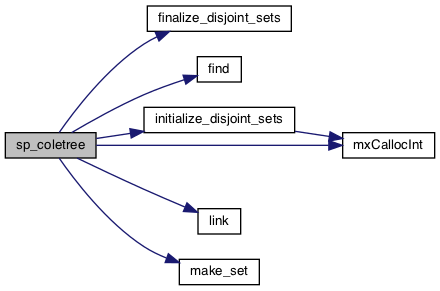
◆ sp_ienv()
| int sp_ienv | ( | int | ispec | ) |
Purpose
=======
sp_ienv() is inquired to choose machine-dependent parameters for the
local environment. See ISPEC for a description of the parameters.
This version provides a set of parameters which should give good,
but not optimal, performance on many of the currently available
computers. Users are encouraged to modify this subroutine to set
the tuning parameters for their particular machine using the option
and problem size information in the arguments.
Arguments
=========
ISPEC (input) int
Specifies the parameter to be returned as the value of SP_IENV.
= 1: the panel size w; a panel consists of w consecutive
columns of matrix A in the process of Gaussian elimination.
The best value depends on machine's cache characters.
= 2: the relaxation parameter relax; if the number of
nodes (columns) in a subtree of the elimination tree is less
than relax, this subtree is considered as one supernode,
regardless of their row structures.
= 3: the maximum size for a supernode in complete LU;
= 4: the minimum row dimension for 2-D blocking to be used;
= 5: the minimum column dimension for 2-D blocking to be used;
= 6: the estimated fills factor for L and U, compared with A;
= 7: the maximum size for a supernode in ILU.
(SP_IENV) (output) int
>= 0: the value of the parameter specified by ISPEC
< 0: if SP_IENV = -k, the k-th argument had an illegal value.
=====================================================================
See ISPEC for a description of the parameters. This version provides a set of parameters which should give good, but not optimal, performance on many of the currently available computers. Users are encouraged to modify this subroutine to set the tuning parameters for their particular machine using the option and problem size information in the arguments.
- Parameters
-
[in] ispec Specifies the parameter to be returned as the value of SP_IENV.
= 1: the panel size w; a panel consists of w consecutive columns of matrix A in the process of Gaussian elimination. The best value depends on machine's cache characters.
= 2: the relaxation parameter relax; if the number of nodes (columns) in a subtree of the elimination tree is less than relax, this subtree is considered as one supernode, regardless of their row structures.
= 3: the maximum size for a supernode in complete LU.
= 4: the minimum row dimension for 2-D blocking to be used.
= 5: the minimum column dimension for 2-D blocking to be used.
= 6: the estimated fills factor for L and U, compared with A.
= 7: the maximum size for a supernode in ILU.
- Returns
- >= 0: the value of the parameter specified by ispec.
< 0: if SP_IENV = -k, the k-th argument had an illegal value.
sp_ienv() is inquired to choose machine-dependent parameters for the local environment.
See ISPEC for a description of the parameters.
This version provides a set of parameters which should give good, but not optimal, performance on many of the currently available computers. Users are encouraged to modify this subroutine to set the tuning parameters for their particular machine using the option and problem size information in the arguments.
- Parameters
-
[in] ispec Specifies the parameter to be returned as the value of SP_IENV.
= 1: the panel size w; a panel consists of w consecutive columns of matrix A in the process of Gaussian elimination. The best value depends on machine's cache characters.
= 2: the relaxation parameter relax; if the number of nodes (columns) in a subtree of the elimination tree is less than relax, this subtree is considered as one supernode, regardless of the their row structures.
= 3: the maximum size for a supernode;
= 4: the minimum row dimension for 2-D blocking to be used;
= 5: the minimum column dimension for 2-D blocking to be used;
= 6: the estimated fills factor for L and U, compared with A;
- Returns
- >= 0: the value of the parameter specified by ISPEC
< 0: if SP_IENV = -k, the k-th argument had an illegal value.

◆ sp_preorder()
| void sp_preorder | ( | superlu_options_t * | options, |
| SuperMatrix * | A, | ||
| int * | perm_c, | ||
| int * | etree, | ||
| SuperMatrix * | AC | ||
| ) |
Purpose ======= sp_preorder() permutes the columns of the original matrix. It performs the following steps: 1. Apply column permutation perm_c[] to A's column pointers to form AC; 2. If options->Fact = DOFACT, then (1) Compute column elimination tree etree[] of AC'AC; (2) Post order etree[] to get a postordered elimination tree etree[], and a postorder permutation post[]; (3) Apply post[] permutation to columns of AC; (4) Overwrite perm_c[] with the product perm_c * post. Arguments ========= options (input) superlu_options_t* Specifies whether or not the elimination tree will be re-used. If options->Fact == DOFACT, this means first time factor A, etree is computed, postered, and output. Otherwise, re-factor A, etree is input, unchanged on exit. A (input) SuperMatrix* Matrix A in A*X=B, of dimension (A->nrow, A->ncol). The number of the linear equations is A->nrow. Currently, the type of A can be: Stype = NC or SLU_NCP; Mtype = SLU_GE. In the future, more general A may be handled. perm_c (input/output) int* Column permutation vector of size A->ncol, which defines the permutation matrix Pc; perm_c[i] = j means column i of A is in position j in A*Pc. If options->Fact == DOFACT, perm_c is both input and output. On output, it is changed according to a postorder of etree. Otherwise, perm_c is input. etree (input/output) int* Elimination tree of Pc'*A'*A*Pc, dimension A->ncol. If options->Fact == DOFACT, etree is an output argument, otherwise it is an input argument. Note: etree is a vector of parent pointers for a forest whose vertices are the integers 0 to A->ncol-1; etree[root]==A->ncol. AC (output) SuperMatrix* The resulting matrix after applied the column permutation perm_c[] to matrix A. The type of AC can be: Stype = SLU_NCP; Dtype = A->Dtype; Mtype = SLU_GE.
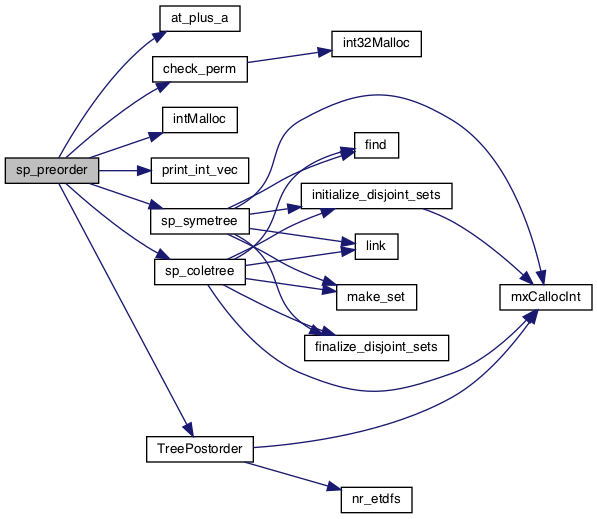
◆ spcoletree()
| int spcoletree | ( | int * | , |
| int * | , | ||
| int * | , | ||
| int | , | ||
| int | , | ||
| int * | |||
| ) |
◆ StatFree()
| void StatFree | ( | SuperLUStat_t * | stat | ) |
◆ StatInit()
| void StatInit | ( | SuperLUStat_t * | stat | ) |

◆ StatPrint()
| void StatPrint | ( | SuperLUStat_t * | stat | ) |
◆ super_stats()
| void super_stats | ( | int | nsuper, |
| int * | xsup | ||
| ) |

◆ superlu_abort_and_exit()
| void superlu_abort_and_exit | ( | char * | msg | ) |
◆ superlu_free()
| void superlu_free | ( | void * | addr | ) |
◆ superlu_malloc()
| void * superlu_malloc | ( | size_t | size | ) |
Precision-independent memory-related routines. (Shared by [sdcz]memory.c)
◆ SuperLU_timer_()
| double SuperLU_timer_ | ( | void | ) |
◆ TreePostorder()
| int * TreePostorder | ( | int | n, |
| int * | parent | ||
| ) |

◆ xerbla_()
| int xerbla_ | ( | char * | , |
| int * | |||
| ) |